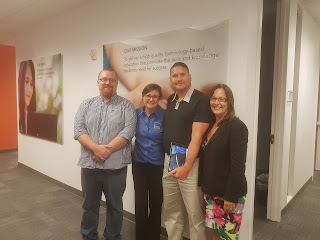Florida Virtual School

Mark & I worked with Florida Virtual School (FLVS) over 3 days of intensive PL. We gained a good overview of their operations and what it takes to produce and facilitate successful online courses. Mark & Josh with FLVS staff Carrie Alexander and Crystal Howard. I really liked the glass prints and mottos. An interesting thing to note was that FLVS use something known as Learning Tool Interoperability (LTI) to develop their own proprietary courses (using additional software) to make them Learning Mangement System (LMS) 'agnostic'. They can then provide their courses to organisations regardless of which LMS they use, whether it is Canvas, Moodle, etc, and are also future-proofing their work. Josh at the FLVS front desk. The pedagogical approach and administration at FLVS was far more structured than with any other online courses that we had seen. For example, there were weekly target quotas for student contact and 'evidence of engagement' for the ...



